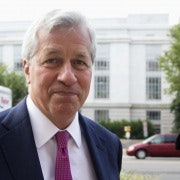Dents are appearing in Dimon's teflon coat
JPMorgan Chase chief Jamie Dimon is Wall Street’s Mr Teflon.
Despite presiding over a bank which has been slugged the biggest fine ever levied on a US company – $US13 billion – Dimon’s grip on the top job appears tight.
To put that record fine into perspective it is slightly more than three times the $US4.5 billion penalty that the US Department of Justice hit BP with for the Gulf of Mexico disaster, which held the ignominious record until now.
The $US13 billion figure is just what JPMorgan will have to fork out to settle a civil case in relation to mortgage bonds it sold investors before the 2008 financial crisis. It doesn’t even touch on the more serious criminal investigation into the bank and its executives which is continuing.
But while people were baying for the blood of BP boss Tony Hayward following the Deepwater Horizon oil spill in 2010, the calls for Dimon’s head are coming from only a few pockets of the media.
Investors showed they had no interest in seeing the 57-year-old relinquish responsibility at JPMorgan in May when a shareholder proposal to split Dimon’s responsibilities as chief executive and chairman bombed spectacularly.
Even billionaire investor Warren Buffet sprung to Dimon’s defence last weekend.
"If a cop follows you for 500 miles, you’re going to get a ticket,” he said on CNBC. “And if you’ve had a lot of cops following for a long time then they’re going to write some tickets."
So what makes Dimon so special that he is exempt from the fate suffered by his banking counterparts such as Charles Prince III at Citigroup and Kenneth Lewis at Bank of America who were ousted during the financial crisis?
It comes down to a combination of his charisma, his connections and his intelligence. That and the fact that he has made a lot of important people a lot of money.
US President Barack Obama has been one of Dimon’s biggest supporters despite the bank’s troubles.
“JPMorgan is one of the best-managed banks there is. Jamie Dimon, the head of it, is one of the smartest bankers we got,” Obama said last year.
However, the president has moved to distance himself from his banking buddy. At a meeting with bankers earlier this month Obama literally put Dimon in a corner, a far cry from his usual pole position alongside the president, and said little to him during the meeting.
Obama is smart enough to know that just because the mud isn’t sticking to Dimon doesn’t mean he won’t get hit by the fallout.
Sure, leaders are allowed to make mistakes but considering Dimon earned $US18.7 million last year, a haircut from his 2011 pay package of $23 million, the buck has to stop with him.
There is no other job I can think of where someone could preside over the losses JPMorgan has faced under Dimon’s tenure and still keep their job.
Let’s take the $6 billion ‘London Whale’ debacle for example. JPMorgan’s risk management policies were so inept that it didn’t even know the exposure it faced from one department’s trades. Even when it was brought to light and the loss was believed to be $2 billion, Dimon shrugged it off as “a complete tempest in a teapot.”
Let’s not forget the bid-rigging in the California electricity market in 2010/11 which may have cost California ratepayers as much as $200 million. JPMorgan paid off federal regulators last year with $410 million to settle the case.
The excuse that Dimon is still managing a good return for investors is also misleading. Figures compiled by data analysts FactSet show that over the past five years JPMorgan shares have risen by 38 per cent, which is actually less than Morgan Stanley (58 per cent) and Goldman Sachs (39 per cent). JPMorgan has actually been the worst performing bank this year, although not by much.
Last month, JPMorgan booked the first quarterly loss since Dimon started in the top job in 2006. Mounting litigation costs saw the bank $US380 million in the red, a startling drop from a year earlier when it posted a $US5.7 billion profit.
That is not to mention Bernie Madoff’s Ponzi scheme which JPMorgan is accused of being “at the very centre” of.
New York Times columnist Andrew Ross Sorkin said this week that the “people who matter”, i.e. “investors, analysts, board members and regulators”, want Dimon to stay on, but the argument ignores the boarder picture.
Anyone who has an interest in seeing confidence restored to the financial markets should “matter.”
Wall Street has long been beating the drum trying to encourage people to reinvest post the global financial crisis but how can investors do that with confidence when they fail to see companies and chief executives being held accountable?
It is not to say that the person that follows Dimon will be any more intelligent, capable or savvy in terms of leading the bank. They probably won’t be. But by falling on his sword, Dimon will show leadership, accountability and, more importantly, he will help restore confidence in not only his company but in Wall Street executives’ ability to put ego aside and act in the greater good.
Mathew Murphy is a Walkley Award winning journalist based in New York.
















